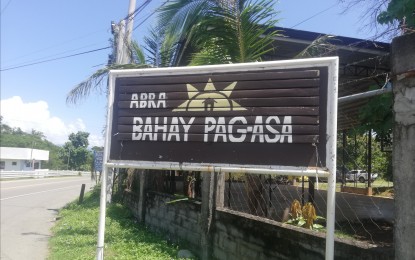
HOME OF SECOND CHANCES. The Bahay Pag-asa short-term residential care in Bangued, Abra stands as a testament that youth offenders have a chance of improving their lives with the reformation and redirection program that the management applies. Established in 2013, at least 159 juvenile offenders have lived in the facility, taken care of by the staff before they are released back into the community and to their families. (PNA photo by Liza Agoot)
BANGUED, Abra – In its almost 10 years of operation, Abra’s “Bahay Pag-asa” continues to help children in conflict with the law (CICL) reform and have a second chance to make their lives better.
Bahay Pag-asa head Jeanietess Brillantes described the center’s role in the society as a “home for second chance” for youth offenders, many of whom have already returned to mainstream society after undergoing a “redirection” process while at the facility.
Abra’s Bahay Pag-asa, established in November 2013 and operated round-the-clock by 17 workers, is managed by the provincial government.
In 2021, it was accredited by the Department of Social Welfare and Development.
Located in Barangay Calaba, the dormitory is in a gated compound with an open gymnasium for sports activities and a wide garden for the residents to relax.
“This is a 24-7 intervention center catering to CICL while waiting for the disposition of their legal cases. We redirect them to the right path,” Brillantes said in an interview on Thursday.
At least 159 CICLs have been catered by the center since its establishment, with 11 current residents out of the 23 attended to since January this year.
The current residents are aged 16 to 26 and were referred to the center when they were minors at the commission of the crime.
“The others have returned to their homes after a court order,” she said.
Under Republic Act 9344 or the Juvenile Justice Act, criminal offenders below 18 years are not mixed with adult offenders in jail.
Instead, they are entered in facilities where their young minds can recover and reform as they grow older, Brillantes said.
“We make them realize that they are here not because they committed a crime but because they need to fix themselves and be good citizens. We provide different programs like psychosocial intervention, life skills training, skills training, and we compel them to continue with their education,” she said.
The center’s programs are aided by other government agencies, the religious sector, private organizations, and others who can help improve the residents.
She said education through the Alternative Learning System (ALS) program of the Department of Education is applied in the center with majority of the residents being out-of-school youths.
“Education is their foundation for a better life when they go back to their community that is why we capitalize on this aside from the redirection process to lead them to the right path,” she added.
Aftercare to center residents
Residents of the center later return home, making it relevant that the community, the local officials and more importantly, the families get involved.
“We continue to monitor and supervise. We make sure that they are doing well and this is done in partnership with local social welfare officers, and the local government officials who give us a progress report about the child,” Brillantes said.
With the system in place and the collaboration of many sectors, the success stories continue to pile up since the center began taking up clients in 2013.
“They are already employed and have established their families. Some have already finished a degree because they were able to catch up while in the center,” she said.
In addition, she noted that many of the former residents continue to make a connection with the center by updating the staff about their current lives.
“They also visit when they are in Abra. I am very happy that I have a lot of success stories to share of the former residents whose lives were touched by the center,” Brillantes said. (PNA)
